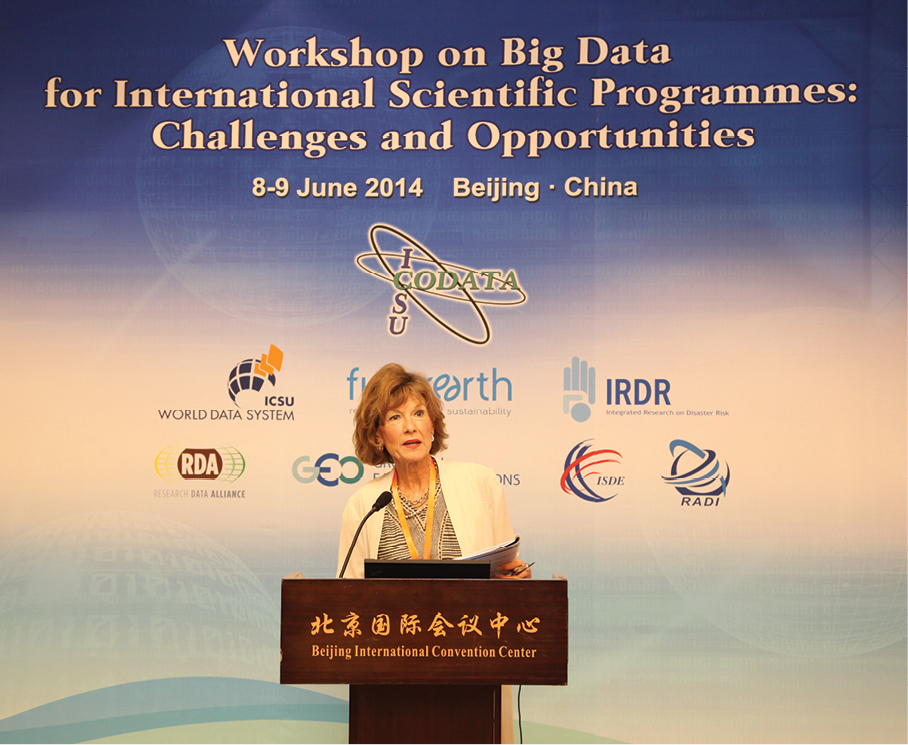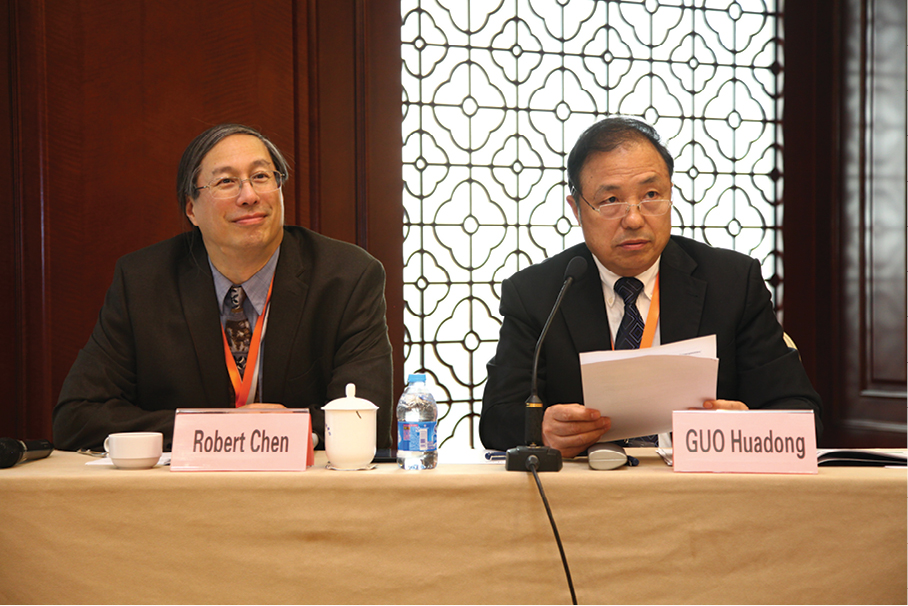Big Data for International Scientific Programmes
-
Simon Hodson
There is little doubt that Big Data is a hot topic. Yet while the significance for Big Data may be demonstrable in certain research areas, there is also a lot of hype (particularly in relation to commercial applications), and its corollary, therefore, scepticism. Convened by CODATA and co-sponsored by a number of important international organisations, the International Workshop on Big Data for International Scientific Programmes took place on 8-9 June in Beijing, and aimed to shed more considered light on the potential role of Big Data in such international and interdisciplinary research activities.

CODATA Secretary General, Professor Sara Graves, chairing the Opening Ceremony
As an interdisciplinary body of ICSU, the International Council for Science, CODATA has a strategic commitment to raise the profile of data issues in ICSU-sponsored programmes like Future Earth and Integrated Research on Disaster Risk. CODATA believes it can play an important role in improving understanding of challenges and opportunities relating to Big Data international scientific programmes where the integration and analysis of sometimes very large, but often complex and diverse datasets will be essential for achieving research goals which aim to improve decision-making on critical issues for humankind and the environment.
Statement of Recommendations and Actions
As a first, practical step towards focusing attention on the potential of Big Data for international scientific programmes, the workshop participants and sponsoring organisations, agreed a Statement of Recommendations and Actions (ref. 1). The Statement recognises that Big Data ‘present particularly significant challenges and notable opportunities for transdisciplinary, international research programmes’ as well as for scientific data services and infrastructure providers. It makes a series of recommendations for the sponsors of international research programmes in order to help such programmes take better advantage of the Big Data age:
1. Respond to the importance of Big Data for international scientific programmes
2. Exploit the benefits of Big Data for society
3. Improve understanding of Big Data through international collaboration
4. Promote universal access to Big Data through global research infrastructures
5. Explore and address the challenges of Big Data stewardship
6. Encourage capacity building and skills development in Big Data science
7. Foster development of policies to maximise exploitation of Big Data
The recommendations are followed by more specific actions for a CODATA-convened Working Group on Big Data for International Scientific Programmes. These actions specify useful contributions that such a Working Group can make in improving understanding of the implications of Big Data for interdisciplinary and societally-relevant research, as well as the policy and stewardship challenges involved with Big Data:
1. Produce case studies in Big Data for international scientific programmes
2. Promote sharing of Big Data solutions across scientific disciplines
3. Research policy, ethical and legal issues for Big Data
4. Research stewardship and sustainability challenges for Big Data
The Working Group will be convened in order to hold a first meeting, to define in more detail its workplan, at SciDataCon 2014, the International Conference on Data Sharing and Integration for Global Sustainability, in New Delhi in November 2014 (ref. 2).
Preparing such a Statement, if it is to be meaningful, is not a task that any one organisation can do in isolation: invited as co-sponsors for the workshop were a number of international organisations with an interest in data stewardship (our sister organisations the ICSU World Data System), data interoperability (the Research Data Alliance), data sharing and reuse (the Group on Earth Observation) as well as international collaborations involved in interdisciplinary research (Future Earth, IRDR and the International Society for Digital Earth), as well as our hosts the Institute of Remote Sensing and Digital Earth of the Chinese Academy of Sciences (RADI). It is hoped that these organisations will also collaborate on the Working Group.

CODATA President, Professor GUO Huadong (right) and former CODATA Secretary General, Dr. Robert Chen (left) chairing the closing panel discussion
Running over two days, the workshop featured four keynotes and twenty-one presentations from distinguished researchers. The opening ceremony was attended by over 100 participants and included agenda setting statements from representatives of sponsoring organisations. The workshop closed with a panel session, chaired by CODATA President Huadong Guo and former CODATA Secretary General, Bob Chen. The discussions were lively and engaged, focussing on finalising the Statement of Recommendations and Actions.
References
1. http://codata.org/blog/wp-content/uploads/2014/06/CODATA-Big-Data-Workshop-STATEMENT-v07-FINAL.pdf 16 June 2014Search in Google Scholar
Report reprinted with permission; http://codata.org/blog/2014/06/16/big-data-for-international-scientific-programmes-a-statement-of-recommendations-and-actions/ Simon Hodson, CODATA Executive Director, invites replies and comments on the CODATA blog.
©2014 by Walter de Gruyter Berlin/Boston
Articles in the same Issue
- Masthead - Full issue pdf
- From the Editor
- Contents
- Features
- Planetary Boundaries and Chemical Pollution: A Grail Quest?
- Research Integrity: Science Community Needs to Address Threats by Research Assessments
- IUPAC and ICSU—A Comment
- Invitation to host the ICSU Secretariat for the Committee on Freedom and Responsibility in the conduct of Science (CFRS)
- Drug Design and Development: A Research Center More Than Twenty Years in the Making
- Youth Views on Sustainability: Size Matters, But So Does Speed
- IUPAC Wire
- Mort Hoffman Receives Chemistry Education Award
- Vânia G. Zuin is awarded the CHEMRAWN VII Prize for Atmospheric and Green Chemistry
- Sébastien Perrier received the 2014 IUPAC- Samsung Young Polymer Scientist Award
- DSM Materials Sciences Award 2014 goes to Prof. Jian Ping Gong
- 2015 IUPAC-SOLVAY International Award for Young Chemists announced
- In Memoriam: Gerrit den Boef
- The Project Place
- Critically evaluated rate parameters for chain-length-dependent termination in radical polymerization of styrene and n-alkyl methacrylates
- Guidelines for assigning values and calculating uncertainties to the standard atomic weights
- Nano-pesticides in the Environment
- Medicinal Chemistry in Drug Discovery, India
- Biological Context by TextData-mining
- IUPAC Recommendations for the definition, preferred symbol for all transport properties
- End-of-line hyphenation of systematic chemical names
- Making an imPACt
- Single-molecule fluorescence imaging by total internal reflection fluorescence microscopy (IUPAC Technical Report)
- Updates to the International System of Units (SI) brochure (8th edition)
- Variation in the terrestrial isotopic composition and atomic weight of argon (IUPAC Technical Report)
- Provisional Recommendations
- Nomenclature and Graphic Representations for Chemically Modified Polymers
- Conference Call
- Big Data for International Scientific Programmes
- CD3—A Celebration More Than 20 Years in the Making
- Solid State Chemistry
- Where 2B & Y
- Highlights in Medicinal Chemistry
- European Polymer Congress
- Point of Care Testing
- Research Integrity
- Mark Your Calendar
- Index 2014
- Stamps International
- The International Year of Crystallography (2014): A Philatelic Celebration
Articles in the same Issue
- Masthead - Full issue pdf
- From the Editor
- Contents
- Features
- Planetary Boundaries and Chemical Pollution: A Grail Quest?
- Research Integrity: Science Community Needs to Address Threats by Research Assessments
- IUPAC and ICSU—A Comment
- Invitation to host the ICSU Secretariat for the Committee on Freedom and Responsibility in the conduct of Science (CFRS)
- Drug Design and Development: A Research Center More Than Twenty Years in the Making
- Youth Views on Sustainability: Size Matters, But So Does Speed
- IUPAC Wire
- Mort Hoffman Receives Chemistry Education Award
- Vânia G. Zuin is awarded the CHEMRAWN VII Prize for Atmospheric and Green Chemistry
- Sébastien Perrier received the 2014 IUPAC- Samsung Young Polymer Scientist Award
- DSM Materials Sciences Award 2014 goes to Prof. Jian Ping Gong
- 2015 IUPAC-SOLVAY International Award for Young Chemists announced
- In Memoriam: Gerrit den Boef
- The Project Place
- Critically evaluated rate parameters for chain-length-dependent termination in radical polymerization of styrene and n-alkyl methacrylates
- Guidelines for assigning values and calculating uncertainties to the standard atomic weights
- Nano-pesticides in the Environment
- Medicinal Chemistry in Drug Discovery, India
- Biological Context by TextData-mining
- IUPAC Recommendations for the definition, preferred symbol for all transport properties
- End-of-line hyphenation of systematic chemical names
- Making an imPACt
- Single-molecule fluorescence imaging by total internal reflection fluorescence microscopy (IUPAC Technical Report)
- Updates to the International System of Units (SI) brochure (8th edition)
- Variation in the terrestrial isotopic composition and atomic weight of argon (IUPAC Technical Report)
- Provisional Recommendations
- Nomenclature and Graphic Representations for Chemically Modified Polymers
- Conference Call
- Big Data for International Scientific Programmes
- CD3—A Celebration More Than 20 Years in the Making
- Solid State Chemistry
- Where 2B & Y
- Highlights in Medicinal Chemistry
- European Polymer Congress
- Point of Care Testing
- Research Integrity
- Mark Your Calendar
- Index 2014
- Stamps International
- The International Year of Crystallography (2014): A Philatelic Celebration

